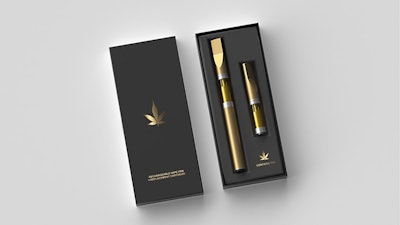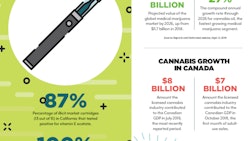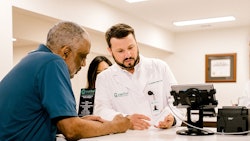
Less than a week after a Massachusetts judge ruled to exclude medical cannabis vape products from Gov. Charlie Baker administration’s four-month ban on all vaping product sales, the state’s Cannabis Control Commission has stepped in and implemented a quarantine on "all vaporizer products."
Suffolk Superior Court Judge Douglas H Wilkins’ ruling lifting the ban for vape products sold in the medical cannabis market had just gone into effect when the commission issued the order Nov. 12. Sales of all vape products, including nicotine and adult-use cannabis cartridges and devices, have been banned in Massachusetts since September amid the national outbreak of lung injuries associated with vape use.
According to the order signed by Cannabis Control Commission (CCC) Executive Director Shawn Collins, the CCC directs “All licensed Marijuana Establishments and Medical Marijuana Treatment Centers … to quarantine vaporizer products based on [the executive director’s] determination that these products pose an immediate or serious threat to the public health, safety or welfare and the quarantine is necessary to protect the public health, safety or welfare.”
Quarantined products include vape pens, cartridges, aerosol products and inhalers, according to the order. The order excludes products "designed to exclusively vaporize marijuana flower for medical-use patients."
The order included a list of findings from the Centers for Disease Control, including the significant discovery announced Nov. 8 that vitamin E acetate was detected in the lung fluids of 29 patients reporting lung injuries, pointing to the additive as a likely culprit in the illness outbreak.
Kris Krane, president of vertically integrated cannabis company 4Front Ventures that includes 11 medical and adult-use dispensaries in six states, says he was pleased to see that the CDC confirmed many suspicions that vitamin E Acetate was at least one agent causing e-cigarette, or vaping, product-use associated lung injury (EVALI). But he says he’s disappointed the agency is still advising consumers and patients to avoid all vaping products.
“What I did find odd and probably unnecessary was that [the CDC] then advised people to continue to not vape, even from legal sources,” Krane says. “[Products with vitamin E acetate] were not from legal market sources.”
The CDC maintains that vitamin E acetate, while one very likely cause, may not be the only factor in the lung injury outbreak, and this was also noted in the Massachusetts CCC’s order.
4Front’s retail brand, Mission Dispensaries, has two locations and a third in the works in Massachusetts. When asked about how the ban has affected sales, Krane did not share specifics and said the ban’s impact on businesses in the industry is not his chief concern.
“The bigger concern that I have is … what it means for those consumers and particularly for the patients. There are a lot of people that like vaping, and for whom vaping is their No. 1 method of administration for their medical cannabis,” Krane says. “Not all of those folks are going to then switch to other kind of medical cannabis products. They are going to find vape cartridges on the illicit market because they are available on the illicit market still. This is the lesson of prohibition—if you prohibit something, the illicit market is going to step in and meet demand.”
As of Nov. 5, 2,051 cases of EVALI have been reported from all states except Alaska, and 39 people have died, according to the CDC.
Krane says in the meantime, Mission is arming its staff with information to share with customers about the regulations and safety testing products on the legal market go through and substitutes for vaping in their Massachusetts locations.
“We operate in multiple states, so in most of our states we still are able to sell cartridges. But in Massachusetts, while you’re not able to get your vape products, not just at our dispensaries but from any of the legal dispensaries, please do not go find products on the illicit market,” Krane says. “We’ve tried to work with them to find products at the dispensary that might better fit their needs.”
Krane advises other dispensary operators to make sure their vendors are reputable and to ask for their third-party test results, and if possible, independently verify those results.
























